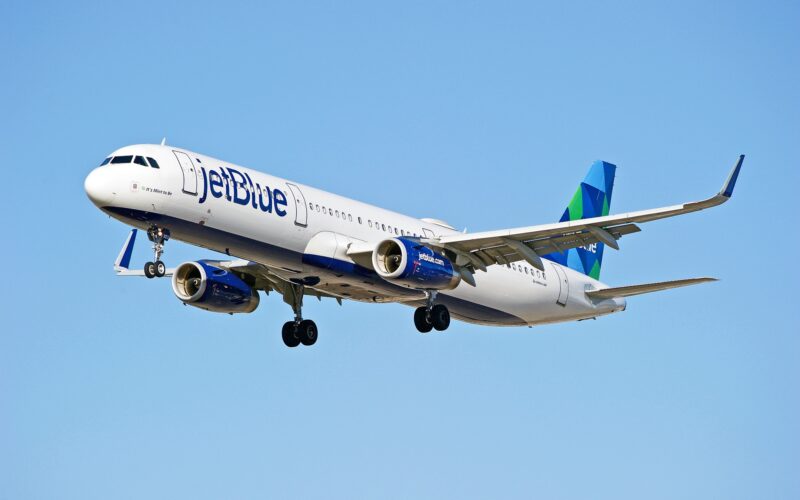JetBlue asks DOT to investigate allocation of Schiphol Airport AMS slots

The United States (US) Department of Transportation (DOT) began proceedings against the Government of the Netherlands following a complaint of “anti-competitive” and “discriminatory” treatment by JetBlue.
JetBlue looked to acquire landing slots at Amsterdam Schiphol Airport (AMS), with the aim of launching direct flights between New York John F. Kennedy International Airport (JFK) and Boston Logan International Airport (BOS) and AMS.
However, according to the complaint, “the Government of the Netherlands is in violation of its obligations under the U.S.-EU “Open Skies” Air Transport Agreement (the Agreement), by failing to ensure JetBlue is provided all operating authorizations, including slots” to operate from/to AMS. The airline filed its complaint on February 14, 2023, while the DOT began its proceedings on February 21, 2023.
Alleged discriminatory practices
The DOT invited all interested parties to provide answers and comments relating to the complaint by JetBlue no later than 14 days following the publication of the order. The US agency is obliged to provide answers within seven days thereafter.
According to the airline, the Dutch government’s refusal to provide authorization and slots to fly into the capital city’s airport violates the International Air Transportation Fair Competitive Practices Act (IATFCPA). The IATFCPA is an act that was signed into law in 1974 in order to protect US-based carriers from “anti-competitive, discriminatory, predatory or unjustifiable activities by a foreign government or foreign airlines”.
JetBlue indicated that the local government did not provide slots to the airline due to a plan to reduce noise in the vicinity of the airport by cutting down the number of annual flight movements at AMS. But the company “asserts that the Government of the Netherlands claims it has no say in the slot coordinator’s decisions, and has made no serious attempt to explain how the lack of any accommodations for new entrants is consistent with the IATA Worldwide Airport Slot Guidelines (WASG) and the EU Slot Regulation”.
Accordingly, the New York, US-based carrier alleged that the government of the Netherlands is treating JetBlue in a “discriminatory and anti-competitive” manner without any “legitimate justification”. JetBlue requested that if the government continued to refuse to provide slots and authorizations, DOT should take a look at “all prior grants of antitrust immunity for alliance agreements among any combination of airlines that includes KLM” and impose a condition retroactively that KLM should give two slots to JetBlue at AMS.
Reducing movements at AMS
However, the Dutch capital’s main airport has been struggling to cope with traffic, and with the government’s ambitions to reduce noise and pollutant emissions, the number of flights has been limited over the past year.
In June 2022, in response to the Dutch government’s decision to cut the number of annual flight movements to 440,000, a 20% reduction over the potential cap of AMS, the International Air Transport Association (IATA) stated that the decision was “crazy”. The Dutch government argued that it was trying to “strike a balance between the importance of a good international airport, the associated good business climate and the importance of a better and healthier living environment”.
“Schiphol has been struggling to cope with demand, which shows how important the airport is, not just to Dutch travelers, but as a strategic hub for the Netherlands,” stated Willie Walsh, the Director General of IATA at the time. Walsh added that the “crazy decision to cut the airport off at its knees will achieve none of the stated environmental aims,” and instead, cause irreparable damage to jobs and economic prosperity.
AMS has also experienced a number of recent staff shortages. During the upcoming May holidays in the Netherlands, the airport anticipates that more than 70,000 passengers will depart AMS each day. To avoid “unacceptable delays for travelers at check-in, security check, and passport control,” the airport’s managing company wants to reduce the number of passengers by 5% during the peak morning hours.
The Royal Schiphol Group, which manages AMS, as well as Rotterdam The Hague Airport (RTM) and Lelystad Airport (LEY) and has a majority stake in Eindhoven Airport (EIN), ended 2022 with a net loss of €28 million ($29.7 million).
“Never before in Schiphol’s history have we disappointed so many travelers and airlines as in 2022. Our efforts and hard work did not lead to the necessary improvements in the system and, as a result, we were not able to provide the service we wanted,” Ruud Sondag, the Chief Executive Officer (CEO) of Royal Schiphol Group said on February 17, 2023.
According to Sondag, 2022 will be a “bad chapter” in AMS’ history, which is why the company “started to implement structural improvements” during the year.
